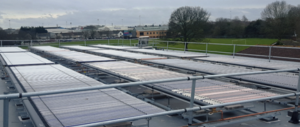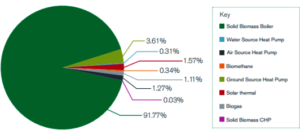Great Britain: Further delays in the start of the Renewable Heating Initiative
March 21, 2011
On 10th March 2011 the UK’s Department for Energy and Climate Change (DECC) published details of their Renewable Heat Incentive (RHI) scheme. This will launch on 29th July 2011 (see press release). The RHI aims to help the UK achieve a target of 12% of total heat consumption coming from renewable energy sources by 2020. It is predicted over the next decade that this initiative will reduce carbon emissions by 44 million tonnes, although this depends on which fuels are displaced.
A sum of Pound Sterling (GBP) 860 million is available through the RHI up to 2014/15. Annual payments are expected to begin in 2011-12 at approximately GBP 60 million per year and to rise gradually to around GBP 420 million by 2014-15. RHI support will also be available back-dated for complying systems fitted from 15th July 2009, although payments on a tariff basis will not begin until July 2011 for the industrial and commercial sector. For domestic householders, the tariffs will not be available until October 2012 and no details of those tariffs are yet announced. Businesses and commercial premises installing renewable heat in the first year of the scheme will benefit from the tariffs over the next 20 years.
Applications and payments will be managed by the UK Office of the Gas and Electricity Markets (OFGEM) and calculated on a metered basis with tariff levels adjusted annually according to inflation. However, the level of tariff for each new application will gradually reduce each year. At present, solar thermal installations will only qualify if less than 200 kWth (286 m2) and receive 0.085 GBP/kWh generated. Larger installations are under consideration from 2012.
Transpired solar thermal air heating systems for the façade are excluded, but it is not clear whether heat intended for swimming pools, cooling or heating will be funded. The theoretical basis of the RHI rests on the definition of ‘renewable heat’ used, where heat is initially generated using a renewable technology or source. The UK government defines this as equipment for example as using energy from the sun, ground, water or sustainably-harvested wood and other plants.
To avoid too much uncertainty in the UK household domestic market for solar thermal, there is to be an interim one-off payment as a single grant called the RHI Premium expected to be worth GBP 300. This will initially be offered only to householders in existing homes and not for newly built homes. To participate in the RHI Premium scheme, householders must allow additional monitoring of system performance. They will then be eligible for ongoing RHI tariff payments from October 2012.
Apart from solar thermal, the following technologies will also receive funding:
- Biomass boilers (Including CHP biomass boilers.
- Ground Source Heat Pumps
- Water Source Heat Pumps
- On-Site Biogas combustion
- Deep Geothermal
- Energy from Municipal Solid Waste
- Injection of biomethane into the grid
The UK’s Solar Trade Association (STA) has responded with disappointment to the latest publications about the RHI, questioning if the scheme will be viable at such low rates (see press release). Howard Johns, Chairman of the STA, commented that: “Solar thermal is such simple effective and easily applicable technology and it is once again being given a back seat. This announcement really shakes the confidence of the industry in the commitment of the “greenest government ever” to deliver.”
Griff Thomas, Senior Microgeneration advisor for ECA Certification (ELECSA), is more optimistic: “The RHI is a world leading initiative which we are delighted to see being implemented; we are confident that this will grow the UK market and when the domestic rates are published will help to ensure the UK achieves our targets”
David Hood, a senior lecturer on the CAT MSc REBE programme, suggests that “the announcement of the RHI has been a mixed bag for the UK renewables industry. The shift in accepted technologies and the move away from deeming are welcome, although the delay in confirmation of the structure for domestic consumers and the potential issues related to metering have yet to be fully worked through. We await with interest forthcoming information from DECC, and hope there will not be significant delays in this.”
More information:
Solar Trade Association (STA): http://www.solar-trade.org.uk
Department for Energy and Climate Change (DECC): http://www.decc.gov.uk


